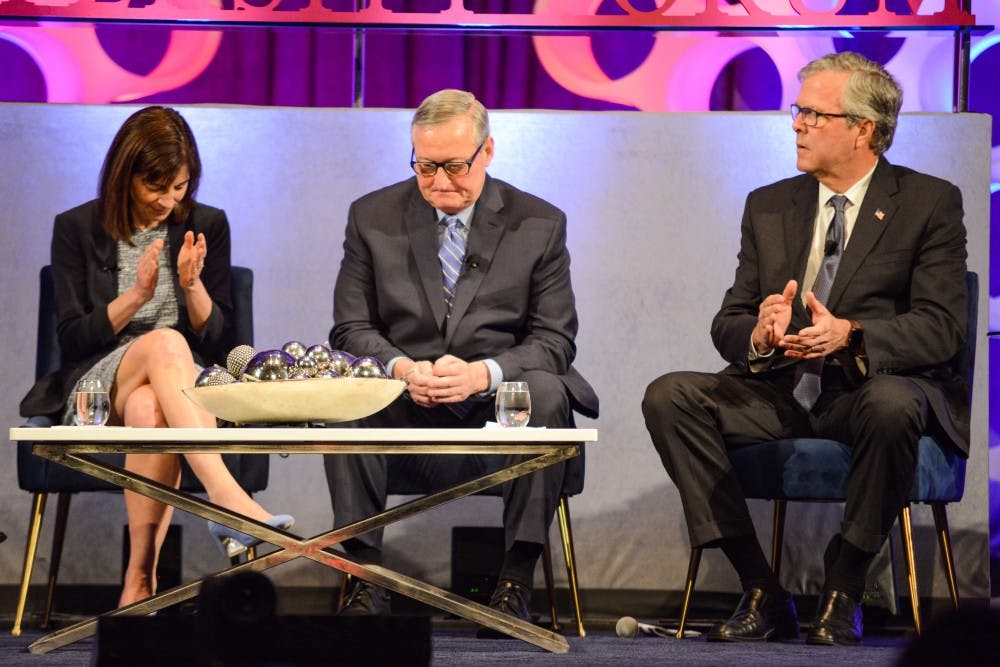Philadelphia's local elections are gearing up, with the public focus on who will take over as the city's mayor in January.
Several seats are up for grabs this year, including the city sheriff and 17 Philadelphia City Council seats. On campus, students are starting to prepare for the upcoming local elections by combatting low voter turnout and encouraging students to get out to vote. Some Penn affiliated candidates, such as Penn researcher Adrian Rivera-Reyes and 1978 College graduate Matthew Wolfe have also entered the race for a city council seat. The battle for Philadelphia mayor, however, has garnered the most attention and will feature four major candidates. Here’s what you need to know about each of them.
The race
The primary election takes place on May 21 and the general election will be Nov. 5.
In the most prominent race on the ballot, one-term Democratic Mayor Jim Kenney is running for re-election. He faces competition from three other candidates, including two fellow Democrats. Kenney is heavily favored to win the Democratic primary, with early polls showing him gaining almost 60% of the vote.
There is only one Republican running for mayor, Billy Ciancaglini, after former front-runner Daphne Goggins dropped out in March, citing a lack of support from Republican officials.
Penn Democrats Political Director Owen Voutsinas-Klose said the organization has not yet endorsed a candidate for mayor. “We have yet to hear from the candidates but are definitely looking to do so before we endorse,” Voutsinas-Klose said.
Meet the Candidates
RELATED:
The Democratic primary is getting crowded. Here's how Penn Dems decides who to endorse.
Mayor Kenney's new policy will increase Penn's security guard wages to $15

Mayor Jim Kenney
First elected in November 2015, Kenney’s term as Philadelphia mayor has been marked by his implementation of controversial local initiatives and Kenney's stout opposition to President Donald Trump’s policies. During his tenure, Kenney has maintained Philadelphia’s status as a sanctuary city and protested the federal government’s travel ban from several Muslim-majority countries.
The incumbent has also led several notable initiatives, such as a $15 minimum wage and a controversial soda tax designed to fund early childhood education in the city. Many of these issues could weaken Kenney’s political prospects, said Randall Miller, a Saint Joseph's University history professor and expert on Philadelphia politics.
“The soda tax issue does anger people,” Miller said. “People are angry about the real estate process, and they might take that out on Kenney to some extent,” referencing the city's affordable housing shortage.
Kenney was previously a long-time member of the city council, during which he earned an outspoken reputation for his fiery usage of social media where he frequently hurled insults at politicians like former New Jersey Governor Chris Christie (R).

Mayor Kenney spoke at Perry World House on Nov. 14, 2018.
Kenney's Democratic Challengers
During his tenure as a senator in the Pennsylvania State Senate, Anthony Williams championed social justice issues, having recently introduced legislation on criminal justice reform and pay equity. Before vying for the Philadelphia mayoral position, Williams previously attempted an unsuccessful campaign for the Democratic gubernatorial nomination in 2010.
Mayor Kenney also faces a primary challenge in former City Controller Alan Butkovitz, who has vowed to end the controversial process of stop-and-frisk policing and attacked Kenney over the city’s soda tax and high homicide rate. Kenney’s team has, in turn, attacked Butkovitz as a “corporate Democrat,” while portraying himself as “a progressive leader who will stand up to the rich and powerful.”
Kenney's Republican Challenger
Kenney’s general election opponent will be Republican attorney Billy Ciancaglini. Ciancaglini is campaigning on ending the soda tax, reversing the city’s status as a sanctuary city, and halting the use of safe injection sites — effectively opposing Kenney on several of his signature initiatives. Unlike many Republicans in Northeastern states, the attorney hasn’t avoided Trump, and has expressed moderate support for the president's job performance.
Although Ciancaglini is mounting a fiery political bid, Miller said the Democratic primary is the real campaign because of the party’s huge advantage in voter registration numbers. According to news site City & State Pennsylvania, the Democratic party maintains a registration edge of more than 680,000 voters in the city.
“You have one party operation here,” Miller said. “The Democratic party has control of the political scene.”









